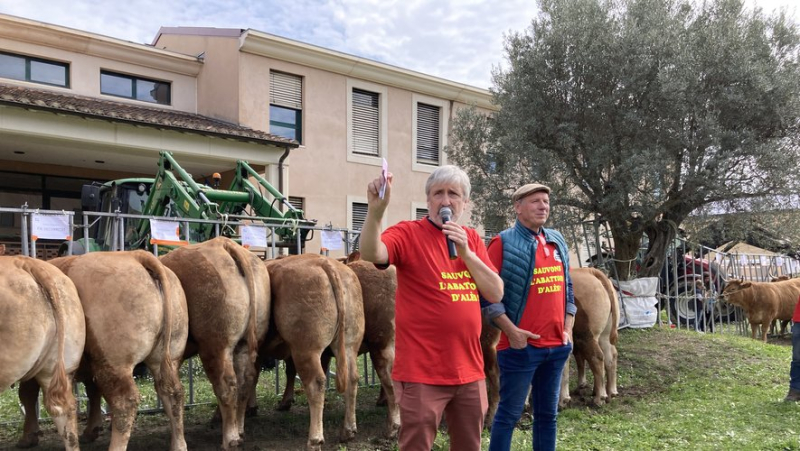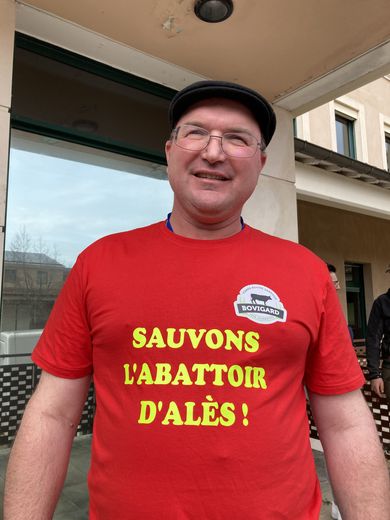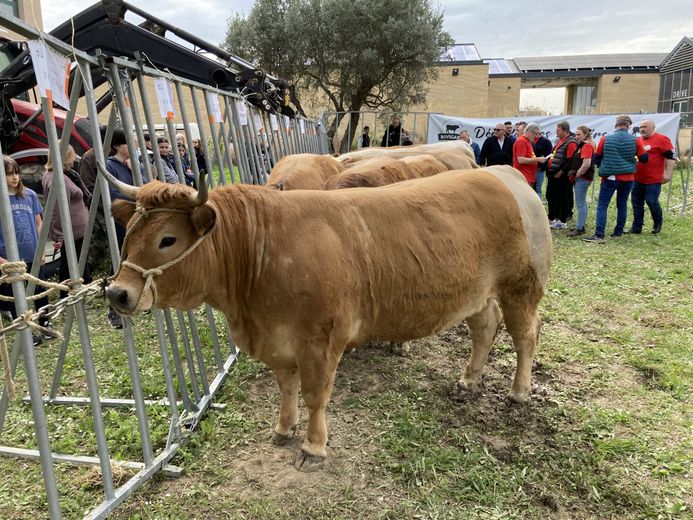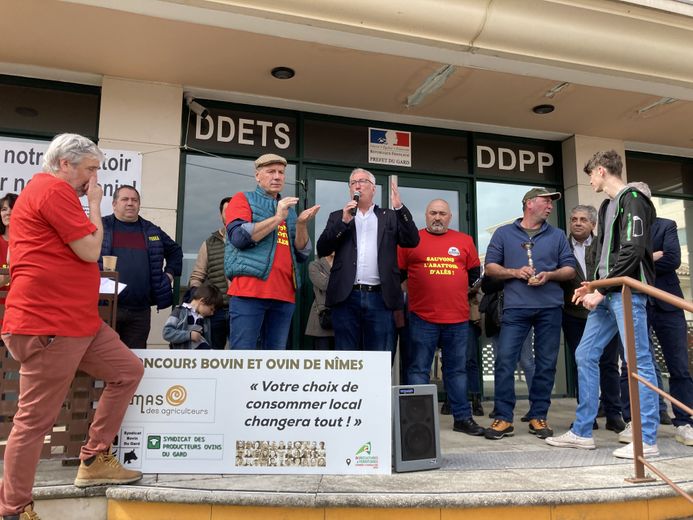“If the Alès slaughterhouse closes, it’s a disaster”: Gard breeders mobilized to save it

Les plus belles bêtes mises aux enchères Midi Libre – K. H.
Le quatrième concours bovin et ovin organisé ce dimanche à la chambre d'agriculture, à Nîmes, a surtout permis aux éleveurs de dire leurs craintes si l'abattoir d'Alès – qui devrait être placé en redressement judiciaire – fermait.
This Sunday, the countryside came to the city! Not in protest mode like on the A9 motorway in February, but for a competition which highlights the know-how of breeders, where the most beautiful cow is auctioned off at 20€ the kilo! But in this festive atmosphere, concern was widely displayed on the red “Save the Alès slaughterhouse” t-shirts. And the general mobilization: the elected officials, who came in large numbers, supported the farmers' fight (1).

Patrick Gravil, president of Bovigard: "Go elsewhere, it will be an additional cost and the end of local sales". Midi Libre – K.H.
In cessation of payments – with a debt of 160,000€ -, the slaughterhouse operates with 2900 tonnes of meat per year, when it would take at least 3,500 tonnes to be profitable, and a hundred breeders. "If it closes, finished& nbsp;short circuits or the requirements of the Egalim law on premises in collective catering, summarizes Magali Saumade, the president of the Chamber of Agriculture. While "livestock farming represents 20% of Gard agriculture and 30% of land", insists David Sève , the president of the FDSEA.
No more short circuits
President of Bovigard, the Gard cattle breeders' union, Patrick Gravil raises around a hundred Limousin cows in Saint-Privat-des-Vieux. "All my meat is valued locally", he insists. Slaughtered in Alès and purchased mainly by three butchers, otherwise for sale locally on the farm. "The slaughterhouse, we go there several times a week, at the request of the butchers, it's work as a grocer… A beast at a time!" Its closure would call into question all this local work. Go to Aubenas, "if'there is still room, nothing is less certain, it will be half a day's journey and an additional cost of travel ;#39;at least 300€ per week. And it won't be recoverable with a single beast…"

Cattle and sheep competition at the Chamber of Agriculture. Midi Libre – K.H.
He will therefore have to make batches of four cows and work with traders. An intermediary who will also increase the price of meat. "And I will no longer do local sales", laments Patrick Gravil.
“A solidarity prize pool”
The commercial court will decide this Wednesday whether the Alès slaughterhouse is placed in receivership. "For 18 months maximum", explains Patrick Viala, president of Mas des agricole. "To save time and restore confidence to everyone, a solidarity prize pool is open. Objective: to raise 200,000 euros; to bail out the slaughterhouse debt. This Sunday, already, 5% of the amount of the auction sales was intended for this kitty. "With only 80 tonnes and 126,000€ of turnover, the Vigan slaughterhouse was saved", he says. Before calling on all communities "to make a gesture of solidarity to the tune of 2,000€ by structure".
"I undertake to pay the first 1% of the debt", lance Grégory Lavatelli, director of the' Intermarché of Saint-Privat-des-Vieux. "The 17 employees of the Mas des Agriculteurs made a donation of 300€, Michel Equipement 2,000€, the Bienvenue à la ferme network and the Mas des agricole will do the same", < /em>adds Patrick Viala who slips "at the end of the hearing, the president of the commercial court informed us, that as personal, he would make a donation.
For the general public, the prize pool is open at the Mas des agricole.
"If we no longer have a slaughterhouse, it's a disaster , warns Claude Méjean who has 140 animals in Saint-Félix-de-Pallières. Half the year, we don't get by on a salary, the other half we get to 700€ per month. Traveling 100 km to bring a cow to the slaughterhouse will not be profitable. Will my nephew even be able to resume operations under these conditions ?" Everyone says it, without a slaughterhouse, no more direct sales nor short circuits but additional costs, intermediaries and "what about animal welfare and the carbon footprint if it is necessary to travel 200 km", adds Benoit Mathieu who makes Aubrac in Saint-Privat-des-Vieux.
"A militant gesture"
For Frédéric Ehret, who has 300 suckling ewes in Aubord since 2018, there is also a question of consistency: "My animals were born, raised in the Gard , they must be slaughtered and processed here. I have neither the desire nor the means to go to Pézenas." At auction time , everyone played the game. Alain Joassan, meat trader, bought several lots: "We are the largest shareholder of the Alès slaughterhouse, we represent 40% of its activity, we fight for the Gard farmers with whom we work a lot" . The manager of the Super U in Anduze buys Claude Méjean's prize cow, "we've been working together for years, it' ;is a militant gesture, smiles Christelle Legrand.
At speech time, Christophe Rivenq, president of Alès Agglo, recalls the community's commitment, " ;15M€ invested over 20 years. This slaughterhouse is 60 years old, we must think about building another more efficient one.

Christophe Rivenq, the president of Alès Agglo, and many elected officials, defended the need for a slaughterhouse. Midi Libre – K.H.
Patrick Viala, president of the Mas des agricole, remains confident: "After the big farmers' demonstration, the turnover of the Mas des agricole increased by 25%. People have understood, consuming becomes a political act.
(1) Present were senator Burgoa, deputy Michel Sala, Philippe Ribot, president of the association of mayors of Gard, the mayor of Saint-Félix-de- Palllières, Cathy Cholet, from the Department, Eric Giraudier, president of the CCI, David Sève, president of the FDSEA, Romain Angelra, president of the JA, Fanny Tamiser, vice-president of the sheep union.
I subscribe to read more




